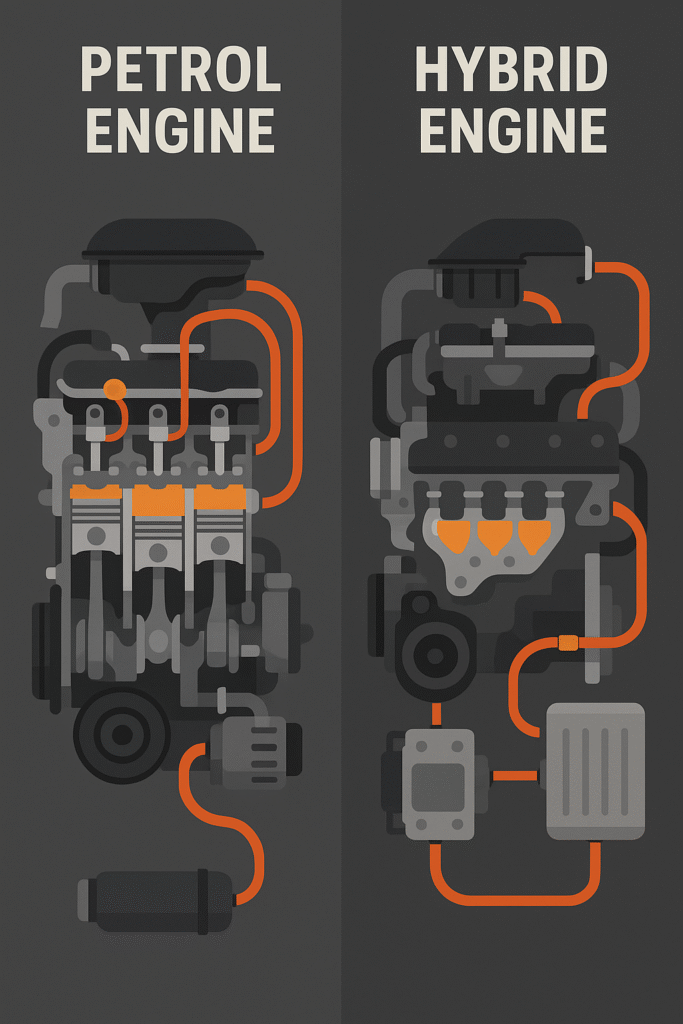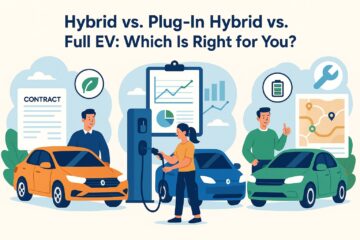
Petrol vs Hybrid Vehicles: A Deep Dive into the Pros and Cons
There is a change in auto industry and when one decides to buy a new car he has a very important decision to make between the traditional car powered by petrol or the alternative one getting heat mostly, the hybrid. Each of these two kinds of cars has its unique benefits and a set of challenges. The bottom line is that regardless of the other reasons why you may want to consider a car that is more fuel-efficient, emits less, or has higher driving distance, you must be knowledgeable of the essential differences between petrol and hybrid car. In this article, we would provide you with the features, benefits, and possible disadvantages of both to help you make a properly-informed choice in accordance with your personal needs and preferences.
Hybrid vs Petrol – A Side-by-Side Comparison
The following is a list of some important elements to bear in mind when comparing petrol and hybrid vehicles.
| Factor | Petrol Cars | Hybrid Cars |
|---|---|---|
| Power Source | It is a pure petrol-engine powered culmination | It has both a petrol engine and an electric motor |
| Fuel Efficiency | Low fuel efficiency in relation to hybrids | Permanently poor fuel consumption, very poor fuel consumption in city environment |
| Emissions | Production of more carbon thus polluting the environment | Less pollution through emissions thus becoming more environmental friendly |
| Upfront Cost | Less expensive than hybrids | More expensive as it has a complicated powertrain and battery system |
| Maintenance | Reduced maintenance costs because of simpler mechanics | May cost more as it has two powertrains and other special parts |
| Driving Range | Further extension with a complete range of fuel (petrol) | A short range that exclusively made use of electricity, but significantly increased in range thanks to petrol engine |
| Convenience | Stores are plentiful, convenient to fill up with fuel | Maybe needing charging as in the case of plug-in hybrid but in most cases easy to fuel as well |
| Government Incentives | There will be generally no incentives offered in the normal petrol cars | It may get some tax redemptions, rebates, and exemptions in certain areas |
| Driving Feeling | Classic driving feel, more engine sound and vibrations | Less noisy, vibration and quiet at low speeds, working on own electric power only |
Which Are the Reasons in Favor of Petrol Vehicles?
The automobile world has been dominated by petrol cars in excess of a hundred years. They are known, trustworthy and accessible. Here is why you can prefer a petrol car:
Reduced Initial Purchase Price
The purchase price of petrol cars is normally cheaper than that of hybrid cars. They are also more economical directly on the spot because the engine technology is simpler and does not use a dual powertrain arrangement.
Better Range
Adopting a longer range of refueling may be a significant benefit to you when you take long journeys on the road frequently in a petrol car. A petrol car can also be distinguished by the fact that unlike a hybrid which can only go as far as the electric power can take him or her, a petrol car can be used without being hindered by the short range restricted by the electric power.
Refueling Convenience
There are petrol stations everywhere and this makes driving a petrol car a trouble free exercise. You will not need to bother about the charging station or a battery that may empty during the travel.
Less Maintenance Complexity
Petrol vehicles sell cheaper engines that require less maintenance and repair on the side of the owner. Hybrid vehicles contain two power trains, so they are more focused on particular care, which may be quite costly.
Negatives of Petrol Cars
Although petrol driven cars have a lot of benefits associated with them, they have their demerits as well:
Fuel Inefficiency
The use of petrol engines would not be fuel efficient especially under urban driving conditions as compared to hybrid technology. This translates to more fuel and more visits to the gas station which may prove to be costly with time.
Higher Emissions
Higher levels of greenhouse emissions or, in other words, carbon dioxide (CO2), nitrogen oxides (NOx), and particulate matter are emitted by petrol cars. This makes them unfriendly to the environment as compared to hybrid cars that run on electricity to reduce emission.
Loud Driving Experience
Petrol engines are quite loud especially when being driven off. The ride is also less comfortable in the internal combustion engines when compared to the use of hybrids, which are smoother.
The Reason to Buy Hybrid
Hybrid cars have a novel, creative solution that incorporates the fusion of the two worlds, namely, adding the electric motor to the petrol engine to make driving more fuel-efficient and environmentally friendly.
Improved Fuel Economy
The designing of hybrid cars ensures that they consume less fuel compared to the ordinary petrol cars. This electric motor cuts on fuel and switches in during the stop-and-go traffic or low speeds to consume less fuel and decrease emissions.
Less Carbon Emissions
By having the electric motor together with the petrol engine, hybrid cars emit a lot fewer emissions as compared to the conventional petrol cars. This will fight Climate change and generate clean air in cities.
Noise and Vibration Free Drive
The hybrid cars have an electric motor that operates without emitting any noise and makes the drive more peaceful and relaxed, particularly, when you drive slowly. This is unlike the petrol powered engines which are very loud and may render driving in the city unpleasant.
Tax Benefits and Government Incentives
There are quite a number of governments giving incentives in buying hybrid vehicles. These may be in form of tax waivers, rebates or even waiving of certain vehicle-related fees until they end up being a cheaper deal in this long run.
Disadvantages of Hybrid Vehicles
Although hybrid cars are flooded with all the advantages, they have their share of drawbacks:
Increased Initial Cost
Technicality involved in the hybrid cars such as the electric motor, battery and the dual engine makes the hybrid cars quite expensive as compared to the petrol cars. Although the long-term fuel savings can cover the cost, the initial price remains a considerable detail to consider.
Electric Range Electrical Range Limited
Hybrid cars are not able to drive long distances using electric power. The electric-only range tends to be short, particularly in the conventional hybrids. Unless you need to travel longer distances you may still have to use the petrol engine, which essentially means you are not getting off the fuel use altogether.
Increasing Maintenance Costs
Hybrid cars are vastly different in terms of knowledge and parts required to fix them, so maintenance may become very expensive. An example is that the hybrid battery might require to be replaced after some years of use which is indeed the costly activity. Even so, hybrids would consume less maintenance as compared to petrol cars at large.
To Buy Hybrid or Petrol Car?
In the end, the choice will fall into your hands based on your driving habits, money, and environmental cares. The decision can be made here:
Select Petrol Car In Case:
- You need a low priced, good car with engine system that is less complex.
- You also take long journeys and do not want to panic with low electric range.
- You want more refueling stations to be available and the costs of maintenance to be low.
If:
- Your main concerns are fuel consumption and fewer emissions.
- You mainly drive in the city or in short trips, here, electric power can be utilized more frequently.
- You wish to make use of governmental incentives of environmentally friendly cars.
Conclusion: Choose to Make the Right Choice
Hybrids and petrol cars have some differences and there is no single answer whether to go to one or the other, it all depends on the individual needs and preferences. Petrol vehicles could be more suitable to those people who need simplicity, higher traveling distances, and a lower price of purchase. Hybrid cars on the other hand offer superior fuel economy, low emissions and a noise free and clean driving environment. Through your style of driving, budget, and environmental issues, you are able to make the most suitable recommendation to your living lifestyle.










